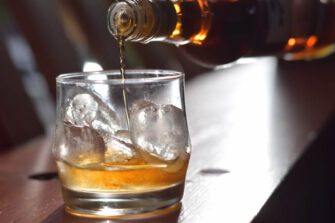The Impact of Intoxication on New York Slip and Fall Cases - We Treat our Clients with Compassion

Alcohol can be a factor in accidents, including slip/trip and falls. While a person who is under the influence of alcohol may fairly be considered partly at fault, it does not mean that they are entirely at fault. In states like New York, which recognizes comparative fault, even persons who consumed an alcoholic beverage can still sue if they believe the other party was negligent as well.
While defendants in a slip/trip and fall case will almost always try to find evidence of alcohol use, alcohol is legal throughout the U.S. for people over the age of 21, and a person who has a drink is still entitled to be safe, particularly when visiting a business establishment open to the public.
In New York, Comparative Negligence/Comparative Fault Decides Fault on Both Sides
Table of Contents
In New York, anyone who has been injured in a slip/trip and fall accident can sue for damages, even if s/he is partly at fault. The State does not dictate who may or may not seek damages after an accident.
New York is one of 12 states that follow pure comparative negligence, or pure comparative fault. This means that damages awarded to plaintiffs who seek compensation for lost wages, medical expenses, pain and suffering, and other out-of-pocket costs resulting from an accident, will have any award reduced by the amount of their own fault or negligence.
While some people criticize this approach to tort law, it actually underscores the responsibility both parties have regarding slip and fall accidents. If an establishment neglects to warn pedestrians or customers about broken lighting, cracked or slippery floors, and other defects, and promptly repair them. even a person who has consumed alcohol may be entitled to compensation.
The Dram Shop Act: Reducing Alcohol Sales to Impaired Persons and Minors
Like most states, New York has a Dram Shop Act that explains when vendors may be responsible for alcohol-related injuries.
Most litigation under the Dram Shop Act comes from a provision that prohibits selling alcohol to a visually impaired person. Circumstantial evidence such as blood test results is not enough to conclude that a seller should have known a buyer was already intoxicated.
The Dram Shop Act is most rigid where minors are involved. Anyone who sells alcohol to a minor is most likely liable for any accident that occurs as a result of the minor’s intoxication.
Things get a little tricky, however, when alcohol is provided, but not sold, to minors. The courts have established that “social hosts” such as parents, for example, can be held liable for accidents resulting from underage drinking in their homes.
Consult an Experienced Attorney for Slip and Fall Cases
If you were involved in such accidents, seek help from experienced slip and fall attorneys at Belluck & Fox, LLP New York for a free consultation. They can help you understand your rights and limitations regarding the case.